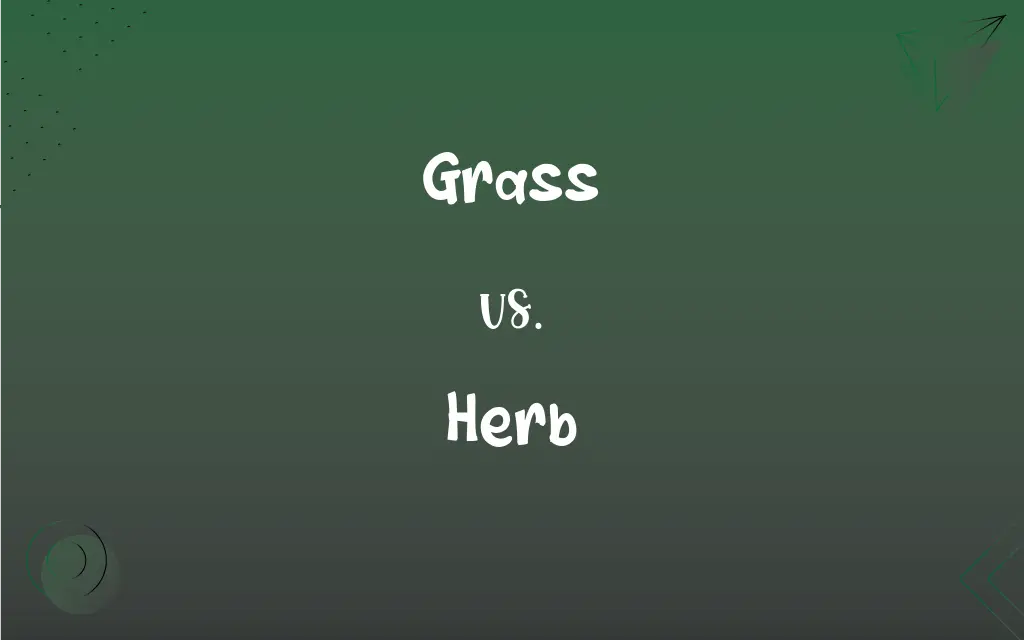Grass vs. Herb: What's the Difference?
Edited by Aimie Carlson || By Janet White || Updated on July 7, 2024
Grass is a green plant with narrow blade-like leaves, while herb is a plant used for flavoring, medicine, or fragrance; not all herbs are grasses.

Key Differences
Grass and Herb, while both pertaining to plant life, denote different kinds of vegetation. Grass typically refers to plants with narrow, bladelike leaves, growing from the base, commonly used to cover lawns and found in fields and pastures. It’s a key component in many landscapes and serves as a crucial food source for herbivorous animals. In contrast, herb represents a wide range of plants valued for their aromatic, culinary, medicinal, or in some cases, spiritual properties, characterized by their green, leafy parts and lack of a woody stem.
Grass, due to its structure and growth patterns, is often associated with ground cover and is a prevalent choice for lawns and sports fields. It tends to be hardy, adaptable, and fast-growing, making it a versatile plant for various uses, including erosion control. Herb, however, encompasses a variety of plant types, including both annuals and perennials, and is typically recognized for its utility in cooking, healing, and aromatic qualities. Different herbs serve different purposes, with some being utilized for their leaves, others for their seeds, and some for their roots.
When assessing grass, the focus is often on its ability to create lush, green landscapes and its role as fodder for animals. It has a simple structure and tends to grow in a uniform manner, creating a carpet-like appearance when left uncut. Herb, conversely, is valued for its diversity and multiplicity of uses. It may be grown for its flavorful leaves, as with basil, its seeds, as with coriander, or its roots, as with ginseng, providing a plethora of options for culinary and medicinal applications.
The contextual usage of grass and herb varies, with grass generally being referred to as a singular entity representing a type of plant or a lawn, and herb referring to a specific plant with unique properties and uses. Grass is universally recognized as a foundational plant in many ecosystems, serving as a primary producer in food chains. Herbs are more specialized, with individual species being sought after for their unique flavors, scents, or therapeutic properties, making them a staple in kitchens and pharmacies alike.
To sum up, grass refers to a specific type of plant characterized by its green, narrow leaves and its role as a ground cover and food source, while herb denotes a diverse range of plants valued for their culinary, medicinal, or aromatic properties. The distinction between the two is largely based on their uses, characteristics, and the value they bring to both natural ecosystems and human endeavors.
ADVERTISEMENT
Comparison Chart
Definition
A green plant with narrow, bladelike leaves
A plant used for flavoring, medicine, or fragrance
Uses
Ground cover, fodder, sports fields, erosion control
Cooking, medicine, aromatherapy, spiritual practices
Structure
Simple, uniform, and grows from the base
Diverse, including both annuals and perennials
Growth Characteristics
Hardy, adaptable, fast-growing, typically perennial
Diverse growth patterns, may be annual or perennial
Typical Context
Lawns, fields, pastures, landscapes
Kitchens, pharmacies, gardens
ADVERTISEMENT
Grass and Herb Definitions
Grass
The members of the grass family considered as a group.
Herb
An herb is a plant with savory or aromatic properties used for flavoring food, medicine, or perfume.
Basil is a commonly used herb in Italian cuisine.
Grass
Any of various plants having slender leaves similar to those of a grass.
Herb
Herb refers to any plant with leaves, seeds, or flowers used for flavoring, food, medicine, or perfume.
Lavender is a fragrant herb used in aromatherapy.
Grass
(transitive) To bring to the grass or ground; to land.
Herb
Herb may refer to grass-like plants that are not woody.
In botany, herb is a term used to describe non-woody plants.
Grass
Popularly: Herbage; the plants which constitute the food of cattle and other beasts; pasture.
Herb
(Slang) Marijuana.
Grass
Grass is a plant with jointed stems, long narrow leaves, and seedlike grains.
The grass in our backyard is lush and green.
Herb
Herb can denote a small, seed-bearing plant with fleshy, rather than woody, parts.
Mint is a refreshing herb that grows prolifically.
Grass
Grass can refer to marijuana in informal slang.
He got caught selling grass.
Herb
A plant whose stem does not produce woody, persistent tissue and generally dies back at the end of each growing season.
Grass
Grass is used to describe plants that resemble grasses but are not of the Gramineae family.
Lemongrass is a useful grass in cooking.
Herb
Any of various often aromatic plants used especially in medicine or as seasoning.
Grass
A member of the grass family.
Herb
(countable) Any green, leafy plant, or parts thereof, used to flavour or season food.
Grass
Ground, as on a lawn, that is covered with grass or similar plants.
Herb
(countable) A plant whose roots, leaves or seeds, etc. are used in medicine.
If any medicinal herbs used by witches were supposedly evil, then how come people from at least the past benefited from the healing properties of such herbs?
Grass
Grazing land; pasture.
Herb
Cannabis.
Grass
(Slang) Marijuana.
Herb
A plant whose stem is not woody and does not persist beyond each growing season
Grass
(Electronics) Small variations in amplitude of an oscilloscope display caused by electrical noise.
Herb
Grass; herbage.
Grass
Chiefly British Slang An informer.
Herb
A lame or uncool person.
Grass
To cover with grass.
Herb
A plant whose stem does not become woody and permanent, but dies, at least down to the ground, after flowering.
Grass
To grow grass on.
Herb
Grass; herbage.
And flocksGrazing the tender herb.
Grass
To feed (livestock) with grass.
Herb
A plant lacking a permanent woody stem; many are flowering garden plants or potherbs; some having medicinal properties; some are pests
Grass
To become covered with grass.
Herb
Aromatic potherb used in cookery for its savory qualities
Grass
To graze.
Herb
Herb is a plant or plant part valued for its medicinal, savory, or aromatic qualities.
Rosemary is an herb that’s valued both for its flavor and aroma.
Grass
Any plant of the family Poaceae, characterized by leaves that arise from nodes in the stem and leaf bases that wrap around the stem, especially those grown as ground cover rather than for grain.
Grass
(countable) Various plants not in family Poaceae that resemble grasses.
Grass
(uncountable) A lawn.
Grass
Marijuana.
Grass
An informer, police informer; one who betrays a group (of criminals, etc) to the authorities.
What just happened must remain secret. Don't be a grass.
Grass
Sharp, closely spaced discontinuities in the trace of a cathode-ray tube, produced by random interference.
Grass
Noise on an A-scope or similar type of radar display.
Grass
The season of fresh grass; spring or summer.
Grass
That which is transitory.
Grass
Asparagus; "sparrowgrass".
Grass
(mining) The surface of a mine.
Grass
(transitive) To lay out on the grass; to knock down (an opponent etc.).
Grass
To act as a grass or informer, to betray; to report on (criminals etc) to the authorities.
Thesaurus:rat out
Grass
(transitive) To cover with grass or with turf.
Grass
(transitive) To feed with grass.
Grass
(transitive) To expose, as flax, on the grass for bleaching, etc.
Grass
An endogenous plant having simple leaves, a stem generally jointed and tubular, the husks or glumes in pairs, and the seed single.
Grass
The season of fresh grass; spring.
Two years old next grass.
Grass
Metaphorically used for what is transitory.
Surely the people is grass.
Grass
Marijuana.
Grass
To cover with grass or with turf.
Grass
To expose, as flax, on the grass for bleaching, etc.
Grass
To bring to the grass or ground; to land; as, to grass a fish.
Grass
To produce grass.
Grass
Narrow-leaved green herbage: grown as lawns; used as pasture for grazing animals; cut and dried as hay
Grass
German writer of novels and poetry and plays (born 1927)
Grass
Animal food for browsing or grazing
Grass
Street names for marijuana
Grass
Shoot down, of birds
Grass
Cover with grass;
The owners decided to grass their property
Grass
Spread out clothes on the grass to let it dry and bleach
Grass
Cover with grass
Grass
Feed with grass
Grass
Give away information about somebody;
He told on his classmate who had cheated on the exam
Grass
Grass is any plant of the family Gramineae, having jointed stems and sheaths and seedlike grains.
Different species of grass have different requirements.
Grass
Grass refers to a ground cover plant that is mowed to maintain a consistent height.
The grass on the soccer field is meticulously maintained.
FAQs
Can an herb be a tree?
Typically, herbs are not trees; they are usually smaller plants, but there are exceptions like the herb Moringa which comes from a tree.
Is grass a type of herb?
In broad botanical terms, grass could be considered a type of herbaceous plant, but not an "herb" in the culinary or medicinal sense.
Can grass grow in every climate?
While grasses are highly adaptable, not every species can grow in every climate.
Is all grass edible?
No, not all grass is edible, and some can be toxic.
Are herbs only used for cooking?
No, herbs are used for cooking, medicine, aromatherapy, and various other applications.
Is there a difference between lawn grass and wild grass?
Yes, lawn grass is often a cultivated variety, while wild grass refers to grasses growing naturally without cultivation.
Can herbs grow in the wild?
Yes, many herbs grow in the wild.
Are all herbs safe to consume?
No, some herbs can be toxic and should not be consumed.
Can herbs be used for medical treatment?
Yes, many herbs have medicinal properties and can be used for treatment.
Can an herb be a flower?
Yes, some herbs, like chamomile, are flowering plants.
Is grass a necessary part of every ecosystem?
Grasses are crucial in many ecosystems but are not present in every single one, like certain desert or aquatic ecosystems.
Can grass be used as medicine?
Some grasses have medicinal properties, like lemongrass, but they are not typically a primary source of medicine.
Is grass a primary producer in ecosystems?
Yes, grass is a primary producer, converting sunlight into energy through photosynthesis.
Do all grasses have similar characteristics?
While grasses share some characteristics, they can vary greatly in size, color, and growth conditions.
Can herbs be used in drinks?
Yes, herbs are commonly used to flavor drinks, such as teas and cocktails.
About Author
Written by
Janet WhiteJanet White has been an esteemed writer and blogger for Difference Wiki. Holding a Master's degree in Science and Medical Journalism from the prestigious Boston University, she has consistently demonstrated her expertise and passion for her field. When she's not immersed in her work, Janet relishes her time exercising, delving into a good book, and cherishing moments with friends and family.
Edited by
Aimie CarlsonAimie Carlson, holding a master's degree in English literature, is a fervent English language enthusiast. She lends her writing talents to Difference Wiki, a prominent website that specializes in comparisons, offering readers insightful analyses that both captivate and inform.































































